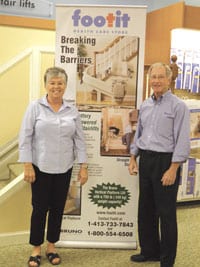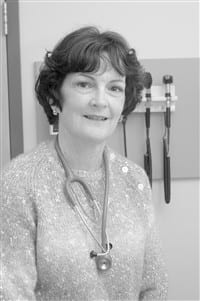The Lifestyle Business – Footit Health Care Store Offers Products to Enhance People’s Lives
When Footit Surgical Supplies Inc. opened in 1953, medical equipment was in its infancy and people had to use their own money to pay for things like wheelchairs and walkers.
“Medicare didn’t exist, and most people didn’t live long enough to need a lot of the things available today, so there weren’t many choices,” said Marc Lucas, who, with his wife, Kathleen Lucas, bought the business from Wallace P. Footit in 1991.
But over the next few decades, sweeping changes in medicine, insurance, and other sectors extended life expectancy and created a new focus on health, wellness, and staying active, which led to a remarkable array of new products.
In 1991, the Lucases changed the name of their business to Footit Health Care Store, which reflects the wide variety of products and services offered in the 4,000 square foot facility in West Springfield.
In addition to walkers, canes, wheelchairs, scooters, incontinence products, and items to help people who are aging, have a disability, or have had surgery, the store is filled with ingenious products to make life easier and more enjoyable. They range from orthopedic bed pillows to waterproof cast covers that allow children or adults with broken limbs to go swimming and/or bathe with ease; from diffusers for people who love the smell of burning candles but don’t want the smoke, to clothing in hard-to-find sizes, such as bras with cup sizes up to J and shoes of all types, including dress and athletic styles in widths up to 6E.
In addition, there are bath products, salves for dry skin, and a custom car seat cushion for people with bad backs. The rear portion is bent to match the shape of a person’s lumbar spine, and Footit allows customers to borrow one at no charge before they purchase the product.
The company has always kept pace with new developments in health care. It was the first in the area to carry lamps that emit a special type of light to help with seasonal affective disorder (commonly known as SAD), which can make people tired and depressed during the winter due to lack of sunlight.
“Years ago, a few psychologists sent people to our store for the lamps. We looked into it and got one that people could rent,” said Kathleen, adding that, although the lamps come in a variety of styles today, a decade ago they were very large and unattractive.
Other products are versatile, such as a no-rinse shampoo that can be applied directly to the hair, then towel dried after being rubbed in. “It comes in a bottle or inside a shower cap. You put the cap on, massage the head, then remove it, comb, and style your hair,” Kathleen said. “Our products include a toilet seat that heats up, washes you with warm water, and blows you dry with the touch of a button.”
Growing Demand
Marc said people are living longer and healthier lives than they did in the past. “They want to maintain their lifestyles and remain in their homes as long as possible rather than going into nursing homes,” he told HCN.
In most cases, that means they and/or their caretakers need to purchase equipment to make it possible for them to remain independent. Although they may have to pay for it themselves, Marc said it is cost-effective, because assisted-living facilities typically cost between $2,500 and $5,000 a month, and nursing homes cost about $10,000 a month.
Kathleen’s 93-year-old mother lives with the couple, and they have installed a stairway elevator in their home and have a lift chair that can raise someone from a sitting to standing position, along with other aids, such as several types of walkers.
But Kathleen said the most immediate need people must deal with is making their bathroom accessible, which can be done with equipment such as a shower chair, raised toilet seat, or removable shower grip bar that adheres to vinyl or tile walls via suction.
Scooters and travel chairs, which are a lightweight version of a wheelchair, also allow people to remain active in the community.
“Trends are changing, and our product selection mirrors this,” Kathleen said, as she showed off a 19-pound travel-style wheelchair that is easy to lift in and out of a car. “In the past, people with mobility issues stayed home, but now they want to get out and live normally.”
Other products that make it possible are lazy-susan-style car seats that swivel, and an adaptive device that helps people with arthritis to open a car door.
In fact, there is a plethora of seemingly unlimited choices and styles of medical equipment. “We carry about 125 different canes,” said Kathleen, offering just one example. “Some people want ones that are pretty, while others want canes that can fold and fit into their purse.”
Footit also carries clothing for women who have had mastectomies, which includes bras, camisoles, and bathing suits. “There has been a lot of change in mastectomy products since we opened,” she said. “Back then, prostheses were very heavy and didn’t feel natural, and insurance only allowed women two bras a year to hold them. Now many insurance companies will pay for three bras every six months, and some of them are gorgeous. We also do bra fitting for people who want to be more comfortable.”
Footit has a shoe department, and although the styles are limited, there is footwear for people with diabetes and shoes for people with wide feet. “As people get older, their feet get wider, and having the right shoes is important because they want to keep moving,” said Marc, who is a certified orthotist.
But their most popular product is compression stockings for men and women. “When we first opened, the ones for women looked like granny stockings. But today they are sheer and come in a wide variety of colors and patterns,” Marc said.
However, it’s not just the products they carry that have made them successful. It’s the personal service they provide and their attention to detail. “We have always made sure that everyone knows exactly what will be covered by insurance,” Marc said.
Gradual Shift
Footit’s foray into the field of healthcare products began when he was a college student. He was working part-time as a delivery boy for Springfield Medical Supply, and when it announced it was closing, he borrowed $350, bought the store’s inventory, and became an entrepreneur.
“He sold his products to doctors,” Kathleen said. “He went door to door and supplied them with unusual items, such as corset-style back braces for women and trusses for men with hernias.”
She added that Footit was imaginative and willing to try new products, and it quickly developed a following. “Wally knew everyone in the area who was in the medical field, and found a need for things that other people might have missed.”
Marc agreed, adding that, when local doctors retired, Footit bought their medical equipment, then resold it to other physicians. “Wally was innovative in the way he approached business,” he said.
A decade after Footit opened his business, hospital stays became shorter, and a national trend toward home-based recovery began. So he continued to expand his inventory, and in 1963 opened a retail store at the ‘X’ in Springfield’s Forest Park. “He had grown up in the neighborhood, and the X was the place to shop at that time,” Kathleen said.
As demand for healthcare products grew, Footit’s business became important to the area. “If people had surgery and needed a walker, back brace, compression stockings, ostomy supplies, or products for their feet like moleskin or an arch support, they had to go to a medical-supply store to get it, and Wally’s compassion, sense of humor, and longtime relationships with area medical professionals made Footit Surgical Supplies a favorite for local doctors who prescribed products for their patients,” Kathleen said. “His advertising slogan was ‘your doctor knows us,’ because they truly did.”
When the owner of Vernon Medical Supply in Springfield retired, Footit purchased that business, which allowed him to add a new product line to his inventory. “It was located on Vernon Street, which is now Boland Way, and the company dated back to the turn of the century,” Kathleen said. “They made orthotics, prostheses, artificial legs, braces, and trusses. Wally moved their equipment, but continued the operation.”
Footit was dedicated to his customers, and after Marc and Kathleen purchased the business in September 1991, he did all he could to help them become successful, including working at the store for a month. They also found allies in loyal medical-supply salespeople who told them which products to buy. In addition, a salesman urged Marc to become certified in orthotics long before insurance companies required it for third-party payments.
The couple made some changes, and in 1994, when the need for more space and parking became apparent, they moved Footit Health Care Store to Memorial Avenue in West Springfield, where they are located today.
Moving Forward
Marc and Kathleen are proud of the service they provide and the number of products they carry, which appeal to a wide range of people.
“In the past, people only came to us because they needed something after surgery,” Marc said. “Now, they come because they want a healthy lifestyle.”
Kathleen agreed, but insisted that their mission remains unchanged. “We take great pride in being a leader in the community and helping to restore dignity and independence to people. Footit has solved problems since 1953, and we want to be here for another 60 years,” she said. “We also want to educate the community about products that are available to enhance their lives. It’s all part of what we do.” v



Comments are closed.